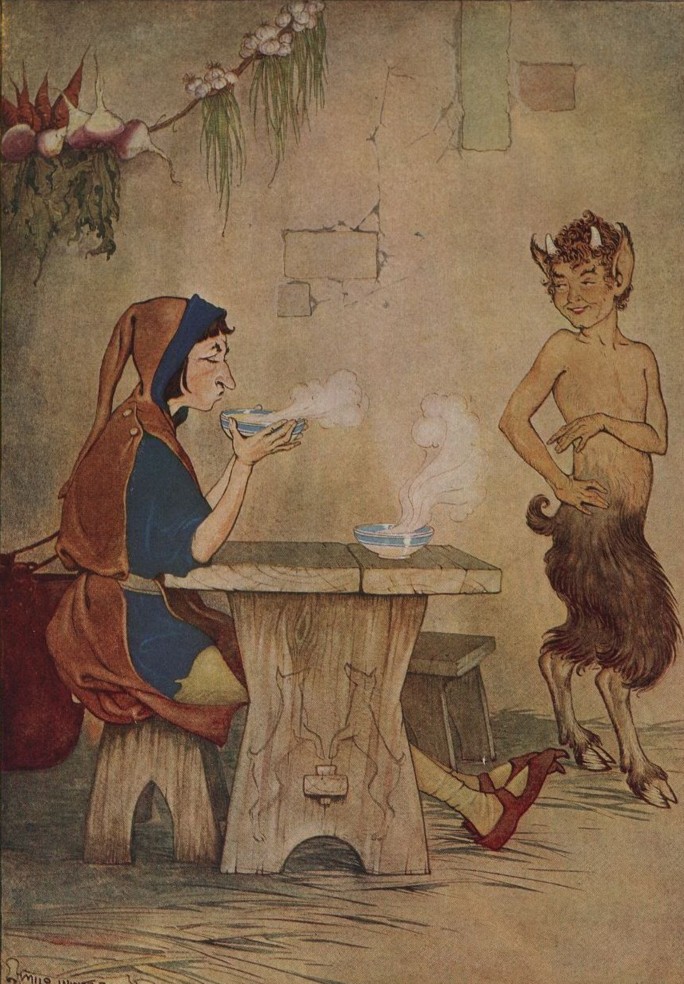| 1. porridge | /PAWR-IJ/ |
| -a thick, soft food made from oats boiled in milk or water, eaten hot for breakfast | |
| When I am sick, my mother cooks porridge for me. | |
| 2. steaming | /steam-ING/ |
| -very hot | |
| I cannot eat the ramen yet; it is steaming! | |
| 3. cheerfully | /CHEER-fuhlee/ |
| -in a happy and positive way | |
| The students looked forward to summer cheerfully. | |
| 4. spring | /spring/ |
| -to move quickly and suddenly towards a particular place | |
| The children were so excited that they sprang to the playground. | |
| 5. fellow | /FEL-oh/ |
| -a person; used to refer to someone in the same situation as you | |
| I met a kind fellow while camping today. |

The two soon became the best of comrades, living together in the Man’s hut. But one cold winter evening, as they were walking homeward, the Satyr saw the Man blow on his fingers
“Why do you do that?” asked the Satyr. “To warm my hands,” the Man replied.
When they reached home the Man prepared two bowls of porridge. These he placed steaming hot on the table, and the comrades sat down very cheerfully to enjoy the meal. But much to the Satyr’s surprise, the Man began to blow into his bowl of porridge.
“Why do you do that?” he asked. “To cool my porridge,” replied the Man.
The Satyr sprang hurriedly to his feet and made for the door.
“Goodby,” he said, “I’ve seen enough. A fellow that blows hot and cold in the same breath cannot be friends with me!
The man who talks for both sides is not to be trusted by either.
| 1. | What did the Satyr see as they were walking homeward? |
| 2. | What did the man do when they reached home? |
| 3. | What did the man do that made the Satyr spring hurriedly to his feet? |
| 1. | Do you agree with what the Satyr did at the end? Why or why not? |
| 2. | What makes the fable interesting for you? |
| 3. | Do you agree with the fable’s lesson? Why or why not? |
| 4. | How can you develop trust in your relationships? |
| 5. | Do you think that being honest is important in friendship? Please explain your answer. |
| Grammar 文法 |
Pronunciation 発音 | Vocabulary 単語 |
Comprehension 理解 |
|
|---|---|---|---|---|
 GOOD GOOD |
文法の誤りはほとんどなく、完全な文章で話すことができる | ほとんどの単語をはっきりと正しく発音することができる | 習った表現を適切に使うことができる | 文章を理解し、質問に正しく答えることができる |
 FAIR |
文法の誤りはあるが、完全な文章で話すことができる | 発音の練習が必要な言葉がいくつかある | たまにミスはあるが、習った表現を適切に使うことができる | 文章を完全に理解するのは難しく、質問に正しく答えられないときもある |
 POOR |
文章で話すのは難しく、単語だけで話すことができる | 発音の練習が必要である | 習った単語と表現を少しだけ使うことができる | 文章を理解するのは難しく、質問に答えるのは難しい |
An eBook from The Project Gutenberg.
This eBook is for the use of anyone anywhere at no cost and with almost no restrictions whatsoever. You may copy it, give it away or re-use it under the terms of the Project Gutenberg License included with this eBook or online at www.gutenberg.org